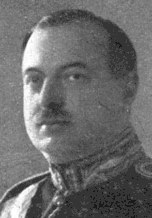Alfredo Rocco
Alfredo Rocco (born 9 September 1875 in Naples – died 28 August 1935) was an Italian politician and jurist. He was Professor of Commercial Law at the University of Urbino (1899–1902) and in Macerata (1902–1905), then Professor of Civil Procedure in Parma, of Business Law in Padua, and later of Economic Legislation at La Sapienza University of Rome, of which he was rector from 1932 to 1935.
Alfredo Rocco | |
|---|---|
 | |
| President of the Italian Chamber of Deputies | |
| In office 24 May 1924 – 5 January 1925 | |
| Preceded by | Enrico De Nicola |
| Succeeded by | Antonio Casertano |
| Italian Minister of Justice | |
| In office 5 January 1925 – 20 July 1932 | |
| Prime Minister | Benito Mussolini |
| Preceded by | Aldo Oviglio |
| Succeeded by | Pietro De Francisci |
| Personal details | |
| Born | 9 September 1875 Naples, Italy |
| Died | 28 August 1935 (aged 59) Rome, Italy |
| Nationality | Italian |
| Political party | Radical Party (until 1910) Italian Nationalist Association (1910–1923) National Fascist Party (1923–1935) |
Rocco, as an economics-minded politician, developed the early concept of the economic and political theory of corporatism,[1] which would later become part of the ideology of the National Fascist Party.
Career
Rocco began his political career as a Marxist in the Radical Party, but eventually turned to the "proletarian nationalism" of the Italian Nationalist Association (ANI), a political party on which he had major influence.[2][3] Rocco was critical of Italy's weak material and economic power, which he said was responsible for Italian dependence on the European "plutocracies" of France, Germany, and the United Kingdom.[4] Rocco also denounced the European powers for imposing foreign culture on Italy and criticized them for their endorsement of individualism.[5] In 1920 he became director of the newspaper L'Idea nazionale, official organ of the Nationalist Association.[6] He later joined the National Fascist Party, after they had merged with the Italian Nationalist Association.[7] In a 1925 speech Rocco interpreted the ideology of fascism as the means by which the individual is sacrificed for the good of society, declaring: "For Liberalism, the individual is the end and society the means. For Fascism, society is the end, individuals the means, and its whole life consists in using individuals as instruments for its social ends."[8]
He was elected in 1921 to the Chamber of Deputies, and became its president in 1924. From 1925 to 1932 he was Minister of Justice and promoted the criminal codification, by signing in 1930 the Criminal Code and the Code of Criminal Procedure (with the help of lawyer Vincenzo Manzini), and reconciling the Classical and Positivist schools with the system of so-called "double track". From 1925 to 1935, Rocco was the Italian representative on the International Committee on Intellectual Cooperation of the League of Nations.[9].
Albert Einstein wrote a letter to the minister, listed in the collection The world as I see it (Mein Weltbild) in which he stated that it was not necessary for Italian scientists to swear allegiance to the Fascist party to continue their educational and scientific activities. In 1935 he was awarded the Mussolini prize by the Royal Academy of Italy.
Appointed senator of the Kingdom on 1 March 1934, he died in Rome in 1935.
Among his students there was the civilist [[Giuseppe Ferri, author of a Handbook of Commercial Law.
In the Florestano Vancini's film The Assassination of Matteotti (1973), Rocco is played by Antonio La Raina.
References
- Payne, Stanley G. 1996. A History of Fascism, 1914–1945. Routledge. Pp. 64
- Dylan Riley, The Civic Foundations for Fascism in Europe: Italy, Spain and Romania 1870-1945, London and New York, Verso, 2010, p. 227
- Allan Todd, Sally Waller, Jean Bottaro, History for the IB Diploma, Paper 3: European States in the Inter-War Years, 1918-1939, Cambridge University Press, 2016, p. 194
- Gregor, James A. 2005. Mussolini's Intellectuals: Fascist Social and Political Thought.Princeton: Princeton University Press. p42
- Gregor. p42-43
- Fonzo, Erminio (2017). Storia dell'Associazione nazionalista italiana (1910–1923). Napoli: Edizioni scientifiche italiane. ISBN 978-88-495-3350-7.
- Chilton, Stephen (22 April 2005). "Notes on Ball & Dagger reader; Alfredo Rocco (1925 [trans. 1926])"The Political Theory of Fascism"" (Web). Selections from The Political Doctrine of Fascism. The University of Minnesota. Retrieved 14 June 2007.
- Alfredo Rocco, “The Political Doctrine of Fascism,” speech delivered at Perugia, 30 August 1925. Speech printed in A Primer of Italian Fascism, Jeffrey T. Schnapp, edit., University of Nebraska Press, 2000, p. 112
- Grandjean, Martin (2018). Les réseaux de la coopération intellectuelle. La Société des Nations comme actrice des échanges scientifiques et culturels dans l'entre-deux-guerres [The Networks of Intellectual Cooperation. The League of Nations as an Actor of the Scientific and Cultural Exchanges in the Inter-War Period] (phdthesis) (in French). Lausanne: Université de Lausanne.
- Rocco D'Alfonso at unipv.it
| Political offices | ||
|---|---|---|
| Preceded by Enrico De Nicola |
President of the Italian Chamber of Deputies 1924–1925 |
Succeeded by Antonio Casertano |
| Preceded by Aldo Oviglio |
Italian Minister of Justice 1925–1932 |
Succeeded by Pietro De Francisci |
External links
| Wikiquote has quotations related to: Alfredo Rocco |

